| Srl | Item |
| 1 |
ID:
130313
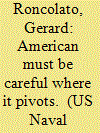

|
|
|
| 2 |
ID:
112115
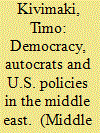

|
|
|
| 3 |
ID:
126739
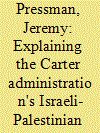

|
|
|
|
|
| Publication |
2013.
|
| Summary/Abstract |
This article challenges critics of the Camp David accords who acknowledge only limited accomplishments or contend the United States was covering for Israeli settlement expansion while seeking to thwart Palestinian self-determination. President Jimmy Carter and his administration sought to create a new pathway toward peace given the unwillingness of Israel's right-wing government under Menachem Begin to support Israeli withdrawal from the West Bank and Palestinian statehood. Carter officials saw the U.S. ideas as a middle way that might get the ball rolling and open a door to peace, however partial and however tentative the process might be at the beginning. Their best-case scenario was that the new U.S. approach would start to transform what the parties thought was possible with regard to the Palestinian question
|
|
|
|
|
|
|
|
|
|
|
|
|
|
|
|
| 4 |
ID:
129497
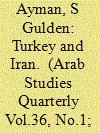

|
|
|
|
|
| Publication |
2014.
|
| Summary/Abstract |
The article starts by stressing the distinctive features of Turkish-Iranian relations. It argues that in order to understand the different stages in Turkish-Iranian relations one needs to define the fine between competition and rivalry, which are usually used interchangeably. It explains the common concerns that united and fostered cooperation between Turkey and Iran as well as the different that persisted after the US invention of Iraq. Delineating under what sort of conditions Turkey emerged as a competitor in Iraq, it evaluates the main instruments Ankara and Tehran employed in their efforts to affect the future of that country. In an effort to explain why this competition heightened, carrying the risk of transforming the two countries' relationship to a rivalry, it elaborates on both countries' approaches and concerns vis-à-vis Syria and the role of the US in shaping the two countries' interactions.
|
|
|
|
|
|
|
|
|
|
|
|
|
|
|
|
| 5 |
ID:
152978
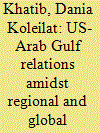

|
|
|
|
|
| Summary/Abstract |
The Arab Gulf has long enjoyed privileged relations with the United States. Being home to the world’s largest oil reserves, the US saw it in its strategic interest to keep Arab Gulf states in its camp during the Cold War. The relation developed over the years to include other areas of cooperation such as in the military, economic and even academic fields. However, many factors today challenge this relationship. In the face of the US’ evident retrenchment from the region, the Arab Gulf is showing more inter-GCC cooperation, and Saudi Arabia is trying to forge alliances independently from the US. At the same time, Arab Gulf countries are intensifying their lobbying efforts in the US.
|
|
|
|
|
|
|
|
|
|
|
|
|
|
|
|